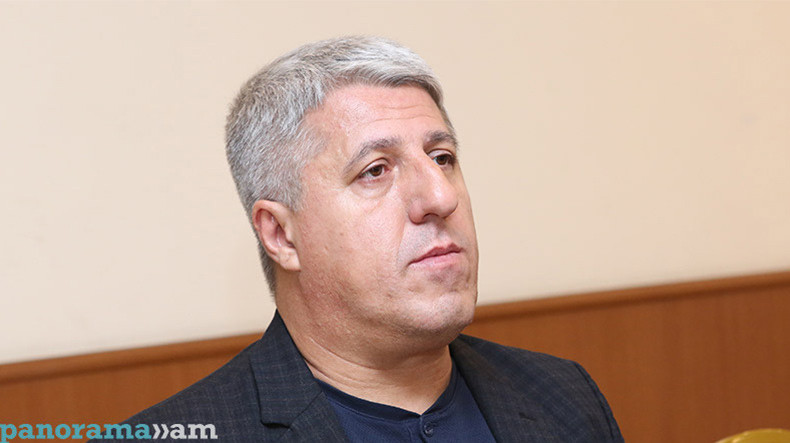
Expert urges Armenian authorities to 'quickly and effectively' address Iran-related issue
Panorama.am spoke with Vardan Voskanyan, an expert on Iran and the head of the YSU Chair of Iranian Studies, about the recent rally in front of the Armenian Embassy in Iran, its possible repercussions and Armenia’s future moves.
Panorama.am: Mr. Voskanyan, how did Iranian media outlets react to the protest?
Vardan Voskanyan: Iranian media actively spread the reports on the demonstration in front of the Armenian Embassy. It was also covered by the Iranian state TV, which comes to show that the protesters, in fact, expressed the views of Iranian government officials, although it’s not spoken out.
Panorama.am: Who were among the protesters? Were they representatives of NGOs or activists?
Vardan Voskanyan: Iranian media identified around thirty protesters as students. Protesters chanted no anti-Armenian slogans, nor did they burn an Armenian flag. The slogans were anti-Israeli, partly anti-American and anti-British. They decried Armenia’s plan to open an embassy in Israel and handed over a letter to the Armenian Embassy, expressing concern over the deepening of its relations with Israel.
If interpreting these events, it becomes obvious that Iran, including its official circles, are seriously concerned over the deepening of Armenian-Israeli relations, considering it as a signal of anti-Iranian actions in Armenia. I think this concern must be dispelled quickly and efficiently. The problem that has emerged must be resolved very quickly; there is no need to further explain the importance of Iran for Armenia's political, economic and security systems. Relations with our southern neighbor provide a certain part of our security not only in Armenia, but also in Artsakh. Therefore, these wrinkles should be smoothed out through diplomatic channels.
Panorama.am: Could Iran’s such a move be expected?
Vardan Voskanian: The Iranian response to the opening of an Armenian embassy in Israel was rather tough, as evidenced by some Iranian media reports some time ago. Iranians assume and have concerns that Israel is pursuing a policy of blocking Iran. Armenia is next in line within this policy.
Before taking such a step, Armenia had to work with all our partners so that we would not have such a reaction. Naturally, such reactions leave some negative impact on Armenian-Iranian relations, which is not in the interests of either Armenia or Iran. It’s beneficial for some states with hostile relations with us, and the fact is evidently used by those countries – Azerbaijan and Turkey. We need to develop more balanced approaches to this issue, as Armenia should never end up at the forefront of the Iran-Israel conflict or become a platform for such a conflict.
We had a certain level of relations with Israel, which is understandable and acceptable for Iran and our other partners. Let me remind you that Armenia has also established relations with Arab countries, which, I do not think, are excited about the deepening of Armenian-Israeli relations.
There is also a problem of communication here. It should be made clear to our society what Armenia benefits from this partnership, what losses the country may suffer or what possible challenges it may face.
Panorama.am: Can we conclude that the problem has stemmed from poor diplomatic work?
Vardan Voskanian: I just present my views and don’t consider it necessary to evaluate anyone's work, but in this case the results of the work are obvious and they should be corrected as soon as possible, because we cannot have problems on our two open borders with Iran and Georgia. I reiterate that this problem must be resolved rather quickly and effectively, so that we don’t have such events fraught with bitter consequences in the future.
Panorama.am: Don't you think that Iran’s protest is an attempt to meddle in Armenia's domestic affairs?
Vardan Voskanyan: In general, any country runs its own policy, taking into account its opportunities. If Armenia has the opportunity to resolve this issue by following the logic you mentioned, it can do so. I think that at the moment Armenia lacks such an opportunity. Many countries in the world do not have this opportunity today; they generally avoid having additional problems with Iran. The world's number one superpower also avoids confrontations with Iran. Therefore, any approach, including in the context of foreign policy, should be based on real assessment of one's own capacities rather than arrogance. Otherwise, arrogance can lead to bad and hard-to-handle consequences.
Panorama.am: What steps should Armenia take under the current circumstances?
Vardan Voskanyan: The country should address the issue through diplomatic and other channels as soon as possible and eventually resolve the problem which we regularly come across in media, already at the level of protest actions. This doesn’t lie in the interests of either the Republic of Armenia or the Islamic Republic of Iran, nor does it fit into the logic of friendly and warm relations that have existed between our two countries in general since the independence.
Newsfeed
Videos






























